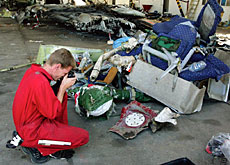
Crash report blames controller and Russian pilots

German investigators say the Swiss air traffic control agency, Skyguide, is partly to blame for a fatal mid-air collision which killed 71 people.
Germany’s Aircraft Accident Investigation Bureau said the crash of two planes over Lake Constance in 2002 was caused primarily by human error.
A Russian charter aircraft carrying over 40 schoolchildren en route to Spain collided with a DHL cargo jet while flying in Swiss-controlled airspace over the German town of Überlingen on July 1, 2002.
In their final report published on Wednesday, the German authorities blamed both the lone Swiss air traffic controller on duty at the time of the crash and the pilots of the Russian Tupolev jet.
The report found that the controller only gave the planes instructions to avoid a collision 43 seconds before impact.
Confusing instructions
The crew of the Tupolev obeyed the controller’s instruction to descend, but failed to listen to their on-board collision warning system which advised them to climb.
As the plane lost altitude, it slammed into the DHL jet which was also descending in accordance with its own collision-avoidance equipment.
According to international aviation rules, on-board collision warning systems should take precedence over instructions from air traffic controllers.
The report called for greater efforts to ensure that such regulations are applied in the same way worldwide.
Skyguide comes in for criticism for allowing only one controller to be in charge of air traffic surveillance at the time of the crash.
Investigators pointed out that the lone controller had been left to monitor two work stations because a colleague was taking a break.
“This accident happened because many actions and failures to act came together that, viewed on their own, might only have a small significance for air safety,” said the investigators in their summary of the report.
Deep regret
The Swiss president, Joseph Deiss, has written to his Russian counterpart, Vladimir Putin, to express his regret about the accident.
“I would like to convey to you my sincerest apologies and once again express our deep regret,” Deiss said in his letter, released by the Swiss government on Wednesday.
He added that the government would find out where responsibility lay and take action, including criminal proceedings if appropriate.
Skyguide – which is majority-owned by the Swiss government – said it accepted responsibility for the chain of events that led to the collision.
“Skyguide accepts full responsiblity for its errors… and is dismayed that its safety system failed on the night of this tragic accident,” said the air traffic control agency in a statement.
The director of Skyguide, Alain Rossier, apologised for the first time to the relatives of those killed in the crash.
“We offer our sincere apologies to the families of the 71 individuals who lost their lives,” he said.
Learning from mistakes
Investigators have urged the Swiss authorities to ensure that in future two controllers are on duty at all times.
Skyguide said it was in the process of adopting safety recommendations contained in the report.
“We had to have this accident to realise that some of our habits were bad,” Rossier told swissinfo.
“[But] we took action and learnt lessons from this tragic accident. I hope that worldwide everybody is doing the same,” he added.
Rossier rejected calls for him to resign in the wake of the investigation, saying that he was determined to continue with efforts to improve the safety of air traffic control.
“The easiest way [would be for me] to resign and walk away. But that’s not my style,” he said.
“I came to the company in 2001 and put a lot of safety measures in place. We’re on the right track… and I’m sure with my 1,300 employees we’ll increase safety in the air.”
Compensation fund
Compensation packages have been agreed with 13 of the victims’ families following an out-of-court settlement with Skyguide.
Talks are continuing with the relatives of other victims.
The 36-year-old Skyguide controller who was on duty at the time of the crash was stabbed to death outside his home near Zurich in February.
The chief murder suspect, Vitaly Kaloyev, lost his wife and two children in the crash.
The 48-year-old Russian was arrested in connection with the murder but has not confessed to killing the air traffic controller. He has admitted, however, that he visited the controller’s house on the same day as the attack.
Kaloyev was moved to a psychiatric unit shortly after his arrest, but court proceedings are not expected for several months.
swissinfo
July 1, 2002: a Bashkirian Airlines jet and a DHL cargo plane collide in Swiss airspace, killing 71.
July 13, 2002: the air traffic controller on duty admits network errors were to blame.
June 2003: Switzerland, Germany and Skyguide agree to set up a compensation fund.
November 2003: a first round of compensation reaches the families of 12 Russian victims.
February 24, 2004: the air traffic controller on duty at the time of the crash is stabbed to death.

In compliance with the JTI standards
More: SWI swissinfo.ch certified by the Journalism Trust Initiative
















![The four-metre-long painting "Sonntag der Bergbauern" [Sunday of the Mountain Farmers, 1923-24/26] had to be removed by a crane from the German Chancellery in Berlin for the exhibition in Bern.](https://www.swissinfo.ch/content/wp-content/uploads/sites/13/2025/12/01_Pressebild_KirchnerxKirchner.jpg?ver=1af8ac75)














You can find an overview of ongoing debates with our journalists here . Please join us!
If you want to start a conversation about a topic raised in this article or want to report factual errors, email us at english@swissinfo.ch.